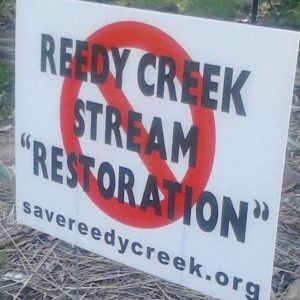I knew my Religion, Ethics, and the Environment class was going to overlap significantly with GeoJames when on the first day of the semester we discussed the the Northern Spotted Owl and its role in the protection of Old Growth Forests, the arguments for and against logging and prescribed forest fires, and dams in the Pacific Northwest and the salmon population they affect. The parallels have become less obvious, but I still find myself making regular connections. Such held true during our early morning field trip to Reedy Creek.
One of my favorite readings for Ethics has been “The Land Ethic: Conservation as a Moral Issue; Thinking Like a Mountain” by Aldo Leopold. In the essay, Leopold defines a land ethic is an ideal relationship between humans and land. Important to this definition is the ability for an ethic to evolve: as human morality has evolved over time to include an increasing number of marginalized minority groups, we should extend our moral consideration to include the land and animals that inhabit it. From Leopold’s perspective, our view of the land as a resource shows that we lack a well formed land ethic. Our society has been conditioned to believe we have dominance over the land, and that attitude is manifest in our manipulation the land for our benefit. Leopold argues that this is unethical as the land has no master, and humans are only part of a much larger biological order.
I was remembering all this as I was standing on the banks of Reedy Creek, listening to Bill discuss the foreseen negative consequences of the proposed Stream Restoration (summarized by Parr), using his handmade tool to determine which of the trees in the riparian zone would be cut down in the process, and imagining Leopold’s impassioned support of the Reedy Creek Coalition’s mission.
He would understand the desire to negate the harm we’ve already inflicted upon the creek and to prevent any further pollution, but would find the city’s belief that humans have the ability to improve upon nature’s wild state misguided at best and abhorrent at worst.
The community seems to be in agreement with Leopold. Once we got close to the creek, almost every lawn was affixed with a picket sign opposing the restoration project. There is an obvious disparity between the land ethic of the city’s government and the land ethic of the community. Leopold would be proud that the community’s ethic has expanded to include the creek, but the question of which land ethic will have the final say looms overhead.

